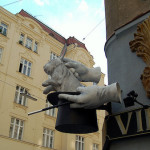We run our website the way we wished the whole internet worked: we provide high quality original content with no ads. We are funded solely by your direct support. Please consider supporting this project.

How To Seek Theological Truth
If we are really interested in embracing true beliefs, then the last thing we would ever do is to try and convince ourselves that we already embrace true beliefs. A genuine concern for the truth is simply incompatible with a concern to feel certain that one already believes the truth. If a person is really concerned with truth, they will try to examine their beliefs critically and go out of their way to confront evidence that has the potential to make them doubt their beliefs.
The rational way to go about deciding whether something is true is to assess the evidence and arguments for and against a truth claim and to base your level of confidence in its truth or falsity on the weight of these considerations. There really is no other way of rationally deciding what’s true or false. Of course the prompting of the Holy Spirit and the testimony of others whom we trust also play an important role in the formation of our beliefs, but these factors should complement rather than replace our rational assessment of truth claims.
Suppose you’re in the market to buy a car. You go to a used-car dealer and find a car that you like, though the dealer is asking more money for it than you think this particular car should go for. But the dealer adamantly defends his hefty price tag by making a number of impressive-sounding claims about the car.
Before you put your hard-earned cash down, you understandably are going to want to determine if the claims the dealer is making are true. And how would you go about this? You’d begin by entertaining the possibility that the dealer’s claims are false, either because he’s sincerely mistaken or (God forbid) because he’s lying. And then, if you didn’t know how to do it yourself, you’d get a friend or hire a mechanic to open the hood, get underneath the car, and do everything that was necessary to thoroughly check the car out.
Now suppose a lot more than your money depended on accurately assessing this dealer’s claims. Suppose your eternal welfare hung in the balance. In this case, wouldn’t you go even further and perhaps get five friends or hire five mechanics to check your car out? The more that is at stake in assessing a truth claim, the more intensely we work to determine if the truth claim is, in fact, true.
A reasonable person’s confidence that a potential belief is true (whether it’s a truth claim about a car or a truth claim about God) is in proportion to the strength of the evidence and arguments that support the belief compared to the strength of the evidence and arguments that count against the belief.
This is the pattern found in Scripture where we are told to seek wisdom, to search for truth, and to rationally consider matters. In fact, Proverbs 8 is about nothing other than this. So too, Luke declares that Jesus gave “many convincing proofs” to people that he had in fact risen from the dead (Acts 1:3). God clearly does not expect people to embrace beliefs without sufficient reason or to try to convince themselves of things beyond what the evidence warrants.
Adapted from Benefit of the Doubt, pages 34-70.
Image by notashamed via Flickr.
Category: General
Tags: Approaches to Theology, Doubt, Theological Method, Truth
Related Reading

Faith or Magic?
Many Christians today treat faith like magic. While the content of what Christians believe is obviously different from pagan practitioners of magic, the way they believe and the motive they have for believing, seems to be very similar. Magic is generally understood to involve people engaging in special behaviors that empower them to gain favor…

Podcast: If Doubt Is Good, Why Did Jesus Rebuke It?
Greg talks about how doubt relates to faith. http://traffic.libsyn.com/askgregboyd/Episode_0453.mp3

Leaving Westboro Baptist: Damsel, Arise
Burstein! via Compfight A reader pointed us to this fascinating article about the defection of Megan Phelps-Roper from the notorious Westboro Baptist Church (Thanks Rocky). She’s the granddaughter of the founder and preacher Fred Phelps. It’s an amazing story of how sometimes doubt can lead to grace and courage. From the article: In the fifth…

9 Reasons Faith ≠ Certainty
One of the things that Christians typically believe in and that I’ve struggled with a great deal is the concept of faith. Like most Christians, I once assumed a person’s faith is as strong as that person is certain. And, accordingly, I assumed that doubt is the enemy of faith. That is, after all, how…

Doubt as a Companion to Faith
A true and living faith is never a destination; it’s a journey. And to move forward on this journey we need doubt. Faith is not based on certainty. Think of it this way. We often cling to certainty-seeking faith like one might a map as if the map itself is actually the territory. But our…

Secret Doubt
J L via Compfight We don’t usually do this, but Jessica Kelley (Henry’s mom) over at Jess in Process wrote a piece about her struggles with doubt, and we got her permission to reprint it in its entirety. She perfectly represents the basic premise of Greg’s upcoming book Benefit of the Doubt. Thanks Jess! Secret…
